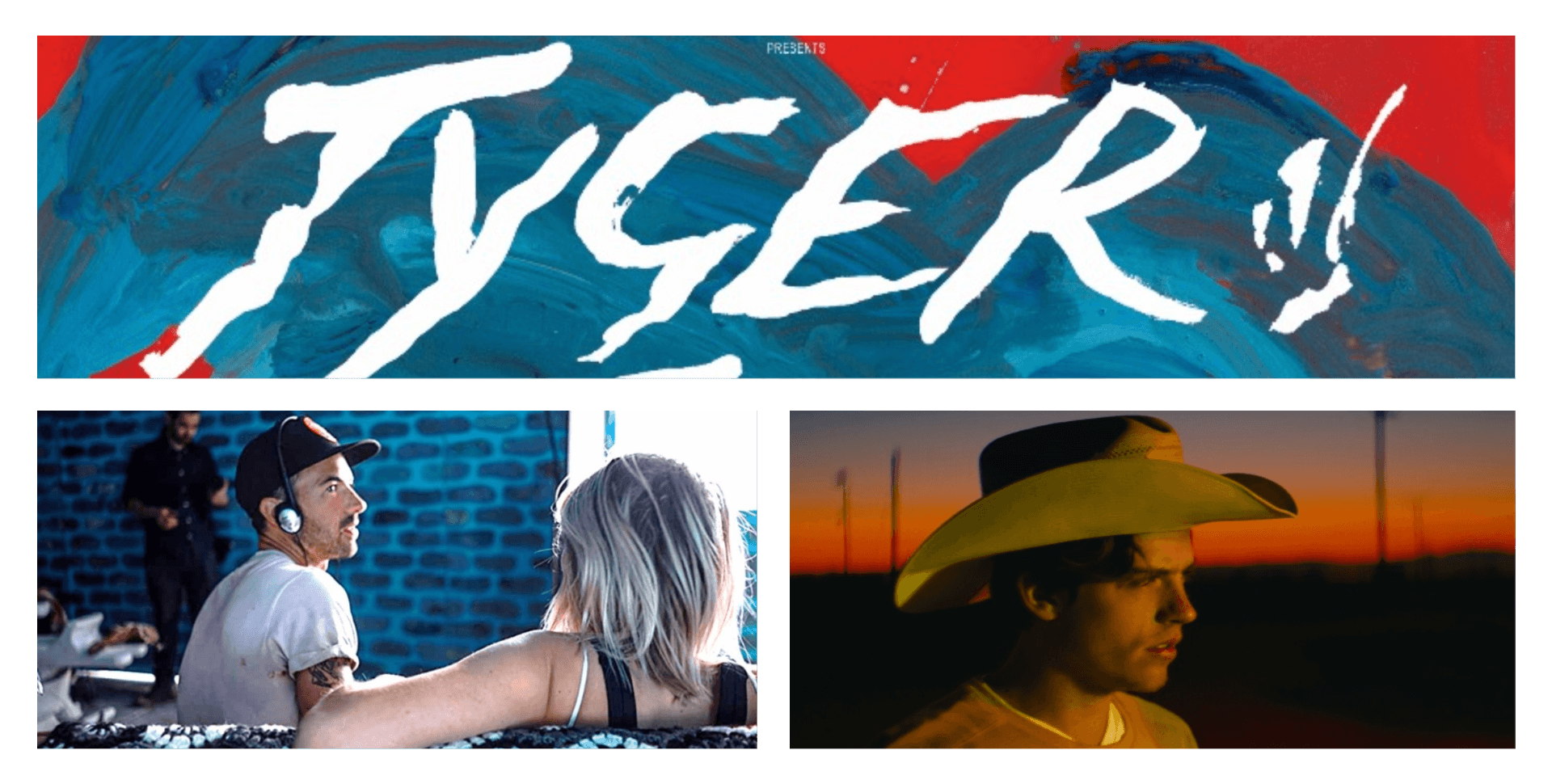Tyger Tyger is the 2021 adventure film that follows two young people who rob a pharmacy and distribute the medication to the sick.
The writer/director of Tyger Tyger, Kerry Mondragon (a mentee of Spike Lee) spoke with Borrowing Tape writer Nace DeSanders on various elements of the filmmaking process.
The film is available to watch via VOD and digital platforms now.
Listen to our podcast episode and/or read the transcript — edited and condensed for clarity:
Hi everyone. My name is Nace DeSanders of Borrowing Tape and I am here with Kerry Mondragon, the writer, and director of Tyger Tyger, a fantasy thriller about Blake and Luke, who rob a pharmacy and act as robin hood like characters distributing the stolen medication to people around the city. Thank you for being here, Kerry.
Thank you for having me.
So to start off, this film was conceptualized, written, and shot all before the current global pandemic. First question: are you psychic? If not, how did you come up with the concept?
No I mean, I'm definitely not psychic. I think it was interesting. It was one of those things where I had felt this sort of an angst, and I wanted to do something. There's elements of it being from the AIDS epidemic too. But somebody asked me this the other day. It's like, I don't remember how the face mask was like a clear indication of it — like a visual aesthetic element. And I don't know, I was talking to Sam about it. I was like, "What? Like when was that decision made?" I'm trying to remember. I mean, it was written in the script, but it was like damn. So, I don't fully know the answer to that. Yeah.
It was absolutely perfect. As soon as I saw it, I was like, "Oh my gosh, here we go." So, how did you go about writing and structuring an unconventional film like this?
Definitely. It's interesting, because now that I'm thinking about it the first, so the first part of it took a very long time for me, right. I'd say maybe two years, just that first 10 minutes. And it was because I was just like, I think it was the old process of how I was used to doing stuff — and I'm a bit of a perfectionist — so I spent so much time on this like concept of like a pharmacy robbery. And then I went down to the location, spent a lot of time with the people down there and all of that happened, like almost like an overflow of just immediately, like it just dictated the script. So I wrote that part of it and like a week and a half, two weeks maybe. And a lot of it was true too. I got stuck in the sand, in the same camp. And so as far out in like a fantastical as it seems it was like kind of true for a lot of it.
Wow, that's amazing!
And also, Sorry. And the other thing is like, there definitely was me processing a lot of my own issues that I had during that exact moment that was like almost in a therapeutic like how am I going to process addictions, love, stuff that I've almost like there's a bit of an amends in it. There's just a lot of that stuff. So, it got/was very personal in that sense too. Yeah.
Oh, wow. The power of art.
Yeah.
Could you tell us where the title Tyger Tyger comes from?
Yeah, it came from like, my mom used to read me this children's book. There was a William Blake, like children's book of poetry, and it's just the first thing that I was drawn to in art, and I would write/draw these tigers and send them to Alan Ginsburg, before he died. And that like had a big impact on me on a more like — at the root, almost like on a soul level is what it felt like. And it's something that I lost for the next 15, 20 years with school and culture and stuff and addictions. And so, it was just strange. It was like right when I had experienced a pretty significant issue with the addiction, like very hardcore rock bottom. That was just what came in that sense. Was that going back to the back to the roots of things a bit. Yeah.
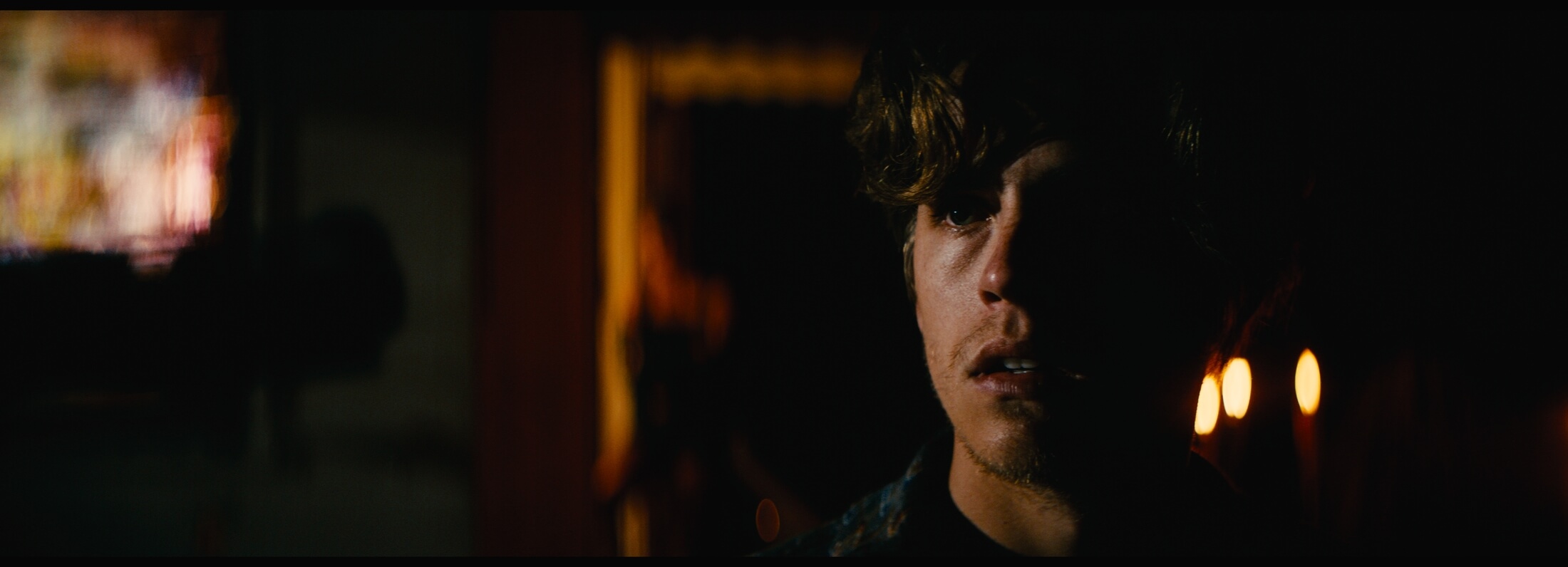
So, the opening credit sequence is super funky with the cards — the artistic style of it. So, what made you want to have that longer, more artistic opening credit sequence?
That fell into place in a pretty magical way because somebody had sent me Melissa, who's the artist of that. She had done this beautiful poetry, like art film collaboration with her art. And I just like instantly saw that as the aesthetic for it that I had been looking for, because I knew I wanted something that spoke to the film. We just had discussed it and she immediately got the style of it. The film very much aesthetically going into it — handheld, gritty, but beautiful. Everything's beautiful, but ugly at the same time. So even the score, we ran it through tape decks to destroy the sound of it. Beautiful score that would go through this or [the] wardrobe, no makeup in the movie, things like that, but they still look beautiful. Like those types of things. And so with her, it was real simple with the: Okay, let's do stop motion animation. So, she was hand painting all those and very intuitive, just let's knock one out, boom, knock... And she's just like a genius all over. Yeah.
Wow, that sounds super cool. The film’s leads do a great job. How was working with Sam Quartin and Dylan Sprouse?
It's incredible. I think they're like different sides of a coin in a way that I felt not only spoke to the title of the movie, but like it's something that it's almost like they compliment each other so well, in a very symmetrical way for me. There was a danger with going cliche, like kind of stepping into maybe the trappings of like casting based off of Dylan or just Sam. I think it can go two directions and I just had to stay so strong with that part. That was like one thing that was so hard on that was just saying no, we like both of them together. Like, it's gotta be that compliment of that. Sam is just incredible as well. And Dylan too, when I first met him, he was like he like pulled me outside. We like met and he was like "Thanks for sending me like those like River Phoenix clips and stuff. But like, I just got to tell you, no way I'm going to be able to channel like River Phoenix at all. I just want to caveat that." And, and I just think it's funny because I was like looking at comments and people like legitimately think he looks like River Phoenix. And so, I like to send him a screenshot of that. I'm like, dude, we kind of did it a little bit here.
As soon as you play it, when I watched the film, I wasn't thinking that. But as soon as you said it, I was like, yeah, he does kind of look like a young River. It's funny. So, the film was shot in Slab City, California and the inhabitants of that area took part in the film, both on and off camera. How did you effectively direct non-actors?
I think the double-edged sword of it is first it's building trust, like trust coming in. Right. The biggest thing I was fighting for on that was we cannot a make a footprint that, that affects that community — it's essentially a tribe, you know? And I didn't want to do what other films have done — where they come in with a bigger crew, and there's already a separation that happens. And one side, there's a power divide that doesn't work. And I think that we were all on the same playing field with that. There were risks with that going into it, but I just knew that if we'd go in with the right intentions with this, it's not only good for the film but just the safety of everybody. It's like a family in a way. I think that allowed everybody to feel comfortable. What worked really well (not just with them), but by playing versions of themselves in a way, you don't get a lot of takes with doing that. But, also I noticed it helped the actors, because it's like oil and water when those two things kind of come together and I think they push both of each other. So, if the non-professional actor down there is doing a great job in this way, then it up levels everybody, you know? And so I thought that thought it worked really really nicely. Yeah. But you can't do multiple takes, I feel like.
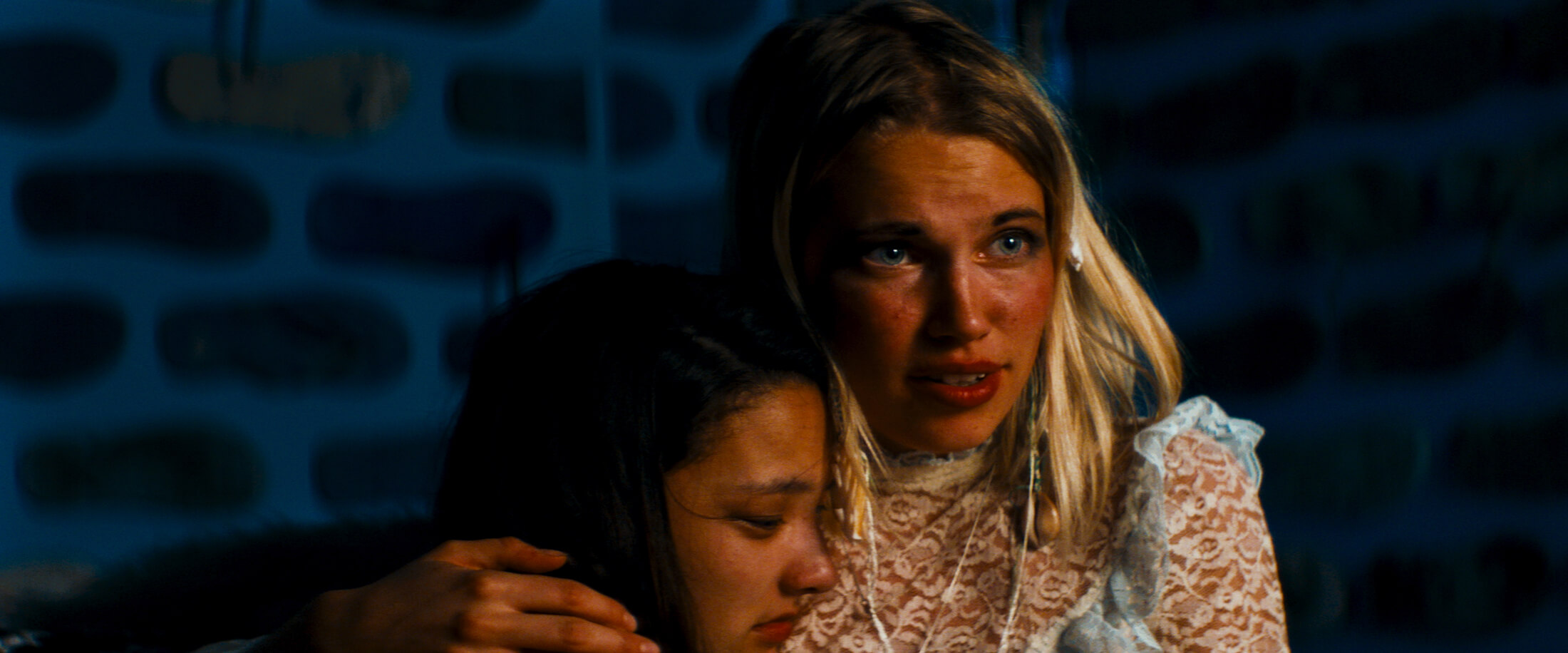
I think that's something a lot of people probably don't consider when they're watching films like that, that you can't do too many takes because of the non-actors. It's very cool. So do you have any interesting stories from your time in Slab city?
Oh yeah. Like there's just some wild. I mean, just as you were wrapping up that, I was thinking, I'm like, "Oh yeah." Well, this guy in Utah was named Utah because he came from Utah, and he's in the motel scene and he's so good. But was interesting. Cause I had my friend Jay, who was also helping with locations. And so, I'd text Jay in the morning and be like, "Jay, man, I really want to get Utah in the scene. Do you know where he's at?" And so, he'd go out and kind of find him in one of the camps. And he's like, "All right, well Utah — he hasn't worn a shirt or shoes in like two months. But we could, he's down, we could shower really quick, but do you have wardrobe for him?" So then I'd go to where I'm like, yeah, we can find... And so then he'd come in and we would do that. And then, I mean, just crazy stories of I don't even know some that I could talk about. Actually, there was one security guy who had discovered that his girlfriend had uploaded videos of them, and it just threw him into this dark place. And so then he — basically long story short, is he came and he threatened some of the cast, Dylan specifically. He was drunk and then he came in while we were shooting on the other part of the town there, and he just burst in and he was bawling, crying. "They kicked me out of my trailer, blah, blah, blah." And I'm like, "Well, I heard you just threatened somebody. What is it?" So then, I put him in the van and I drive him to where the people that kicked them out were, and then I convinced them not to kick them out. And then Dylan and the cast, they were all in this drama situation — it was very dramatic. But, the moral of that was if you're being extorted down there...I think the main thing was we came in with this intention to not cause any sort of problems with this in the community. And it's so important that we maintain that, you know? And, and it just that's the rules and the rules don't apply. Like, it wouldn't apply in LA to do something like that, but it would apply down there because there's just different laws and stuff.
Okay. This is really cool.
Wait, do I got time to tell one more story?
Absolutely. Go for it.
Okay. Okay. This other one is really funny. So then last day like the drip truck gets stuck in the sand. We're trying to get out. And then Dylan texted me and he's like, "Man, I think Cody stole my Nintendo from the trailer." I was like, "Are you serious?" I was like, "Oh no." Like Cody was in the film and he lives down there and it was just this wrap-up of the end of that. It was so symbolic because Cody was there all the time and he was the first person I met down there. Cody — he was shooting his friends with BB guns. And before I had actors, I was just going to make a movie about that. Like kids just shooting each other with BB guns because I kinda related to that.
So on the last day, Cody had stolen Dylan's Nintendo. So Dylan basically — he did it so beautifully — like such an older brother thing. He drove with middle school and had like a heart to heart, sit down with them like, "Hey man, don't steal. If you were to ask for it, I would have given it to you." And, it was just a really touching sort of thing. And so, I went to Walmart and bought him — gifts to [for] Cody and I bought like a stuffed tiger, and then I just dropped it off his trailer before I left. Yeah. So, that's another cool story.
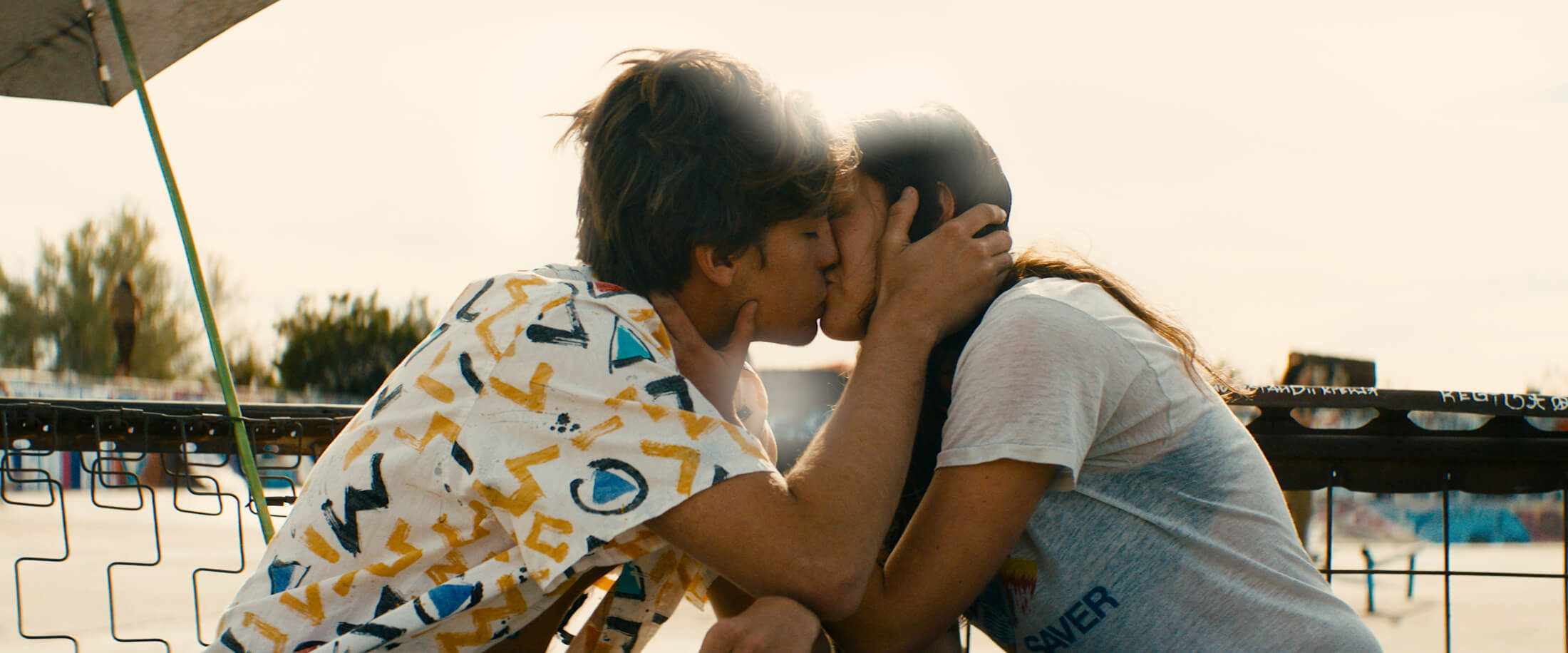
That's so sweet. So, were you living in Slab city while shooting, or were you guys like living outside the city and commuting in?
Yeah, so when I went down there, I stayed there for a week in the beginning, I think a week or a little bit more. And then as I was writing — so I wrote down there — the rest of it, then came back to start prep. My friend had lost his house. This is like crazy magic that happens. So, he loses his house, his housing situation. And I had met him in rehab — just to be honest about that. So, I meet him in rehab and I trusted this guy so much, Jay. I was like, "Dude, it would mean a lot to me if you just went down and stayed with Rabbitside camp down there and just help me because it's four hours away." So, he went down there and he stayed there for like two months, while we were prepping and it was the most critical thing because it allowed us to have open communication with everything and it just was very effective in maintaining sort of a balance and harmony within the community there.
Wow. Sounds like a wild time.
Yeah, pretty wild. It was pretty wild for sure.
So I'm going to switch gears a little bit. I understand that you were a mentee of Spike Lee. How did that relationship come to be?
That was like wild. I mean, I love Spike so much. I have so much love for him. But the way that I went about it was way different. So he was doing this Kickstarter campaign and I just was super annoying. Okay well, let me just caveat this by saying I was using and not well during that time, however. So I was really annoying probably on the Vimeo and I just blasted through it and his assistant I guess had sent it to him and the next morning, I got a call from Spike. He said, "Hey, your offer's interesting. Let's talk." And so then, I call him back and I'm trying to pitch myself as a producer. He's like, "Nah, I don't think you're a producer, maybe talk to mine, maybe talk to the producer that's on it. maybe come out here and assist me." So, I went out there and I got thrown, was being thrown right into it. And it was one of those things where, I mean, he even said, "Look, you got to keep up with this." It was so key for me, because he runs it like a team, like a basketball team almost. And having this comradery of people that have worked with him since... it was like Ruth Carter, like legends that are on this film set, and it's just that family vibe. And he would say (Jason, the producer said): "it never changes making a movie, you're going to do the same stuff in from the first one to the last one. No matter how successful, it's all the same — in the sense that you're doing the same process, it's just more people, more money, or more days. But yeah, it was like my boot camp for sure. And I made it through the whole thing, went to Martha's Vineyard with them. So, it was like a little bit of the prep, or a couple of weeks of the prep, the shoot. He had his editor who was teaching his class at NYU, so I could go and sit in on the class and learn. I mean, it was just a gift. It was such a gift. Cause I never went to film school, you know, so that was like my film school. That was my film school. And I think and then the dark side of that too was I was using during that time, and getting clean after that was a lot of shame with that. And, I just felt like he had a lot of patience with me, I would imagine. And I think that it just speaks a lot to him as a person. And I grew up watching his movies too. So, it was like a lot of that seeped in into the process.
Noticing a theme. There's a wild story for everything with you.
Yeah. There's kind of is a wild story for sure.
So, how did Spike's teachings help you on this project?
It was really fundamental. It was really like basic stuff. At that point, I had known enough about the craft of filmmaking, cause I'd worked on a lot of commercials, and just grew up wanting to be a director and a writer. At the end of the day, the idea of 'by any means necessary. Like he gave me the sweatshirt that had a patch on it. Right. And, I apply that. There's a context to that that I relate to so much, and I think that it using that in a sense also with making a movie, but it's doing it in a very morally and spiritual sort of way, where like gifts happen. As if you just go with the right intentions, you know? And I think that it was key for me because on this film, I did it completely opposite of how I'd done anything in my past. In the past, it was very much what am I going to get? Like, what am I gonna get? What is the world going to reward me with? And, it's a trap that a lot of people, younger people, or in film. It's just like, "that's it," because it's part of the culture. And on this, I was like, I can't control nor do I want to control any of that anymore. I can control what I contribute. And if stuff comes, it comes. But like, that's it. And what's interesting about that is it does. Stuff does come, you know, but it doesn't, it just shows up in a different form.
And yeah, and that's definitely from Spike, a lot of that was in that sense. And how to run a set like a coach. You gotta flip a switch sometimes, and just like get stuff done. Yeah, cause we only had 16 days, so it was a really short shoot. So, I had to be really really efficient and none of the locations were locked. It was definitely intense.
Wow. The pharmacy too, the pharmacy wasn't long?
No, well we didn't have budget for the pharmacy at first, because it's shooting in pharmacies is kind of like shooting in a bank. It was what I realized. So me, that guy, Jay, and the DP on our day off are like, "Let's just go into town and just knock on doors." And we went, the first one we went to was White Cross pharmacy down in Brawley. Shane was just like the coolest pharmacist ever, and he's in the movie and that's his pharmacy.
I mean, that guy was such a gift, because also we had left a script there, somebody left a script and then he calls me a week later and he's like, "Hey man, somebody left a script here and I read it and are you taking any investors or anything?"And I'm like, "I haven't had one yet, but if you want to invest, that'd be awesome." So Shane, the pharmacist is like our first investor for the movie. So, that was really cool. Yeah.
That's wonderful, that's the dream.
I know, I know. [laughs]
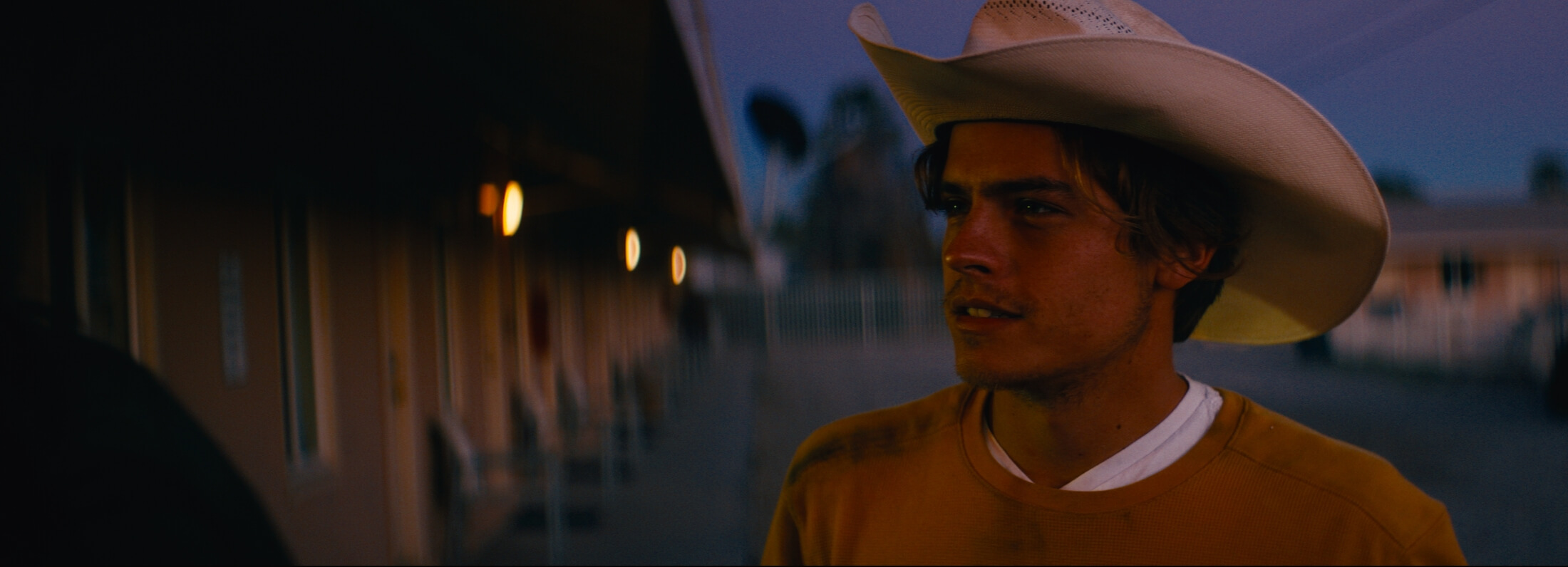
That's crazy. So, which films or directors have influenced you as a filmmaker, but also the film Tyger. Tyger?
Hmm. I would say for Tyger Tyger. It was a lot of poetic realism stuff that was like from like the twenties [thirties] in France — as pretentious as that sounds. But it was mainly — a lot of them were anarchists, like Jean Vigo. They call it 'poetic realism; because it's a lot of real, shooting on location, even a lot of the themes. And I learned this after mine, have to do with love — one shot at love that doesn't have the best ending. Back in the day with those was like working-class people, real locations, some actors in there, but there was a hint of poetry or a hint of some sort of magic in it, you know? And they're just so beautiful. But there weren't a lot of those films.
And then it was interesting, like a lot of stuff that I grew up with as a kid like sneaking into movie theaters and stuff. There's two that I remember clearly. This movie Tank Girl from like the nineties, that movie, which I love still, but that there's little components of that to seeped in. Romeo and Juliet from 1996 somehow made its way into the film in a very color palette, like aesthetic. And yeah, the main one would be Rainer Werner Fassbinder — he was a very prolific director who died pretty early. I guess I connected a lot to him. A lot of his actresses had a lot of soul and a lot more depth than I think most films in the seventies had. But, so with me, I think what I relate to a lot with that is — for some reason, it's easier for me to express myself (or it was with Tyger Tyger) through a woman's...it's weird. It's like a surrogate almost, like I can express things. And I think it's because of the tools, or the world, I just knew — especially with Sam, it's like you can express that. It was an easier channel for me to do that with, and I think I'm sure that was the case with Fassbinder, as well.
Well, that's really interesting. So, what is something you want audiences to take away from your film?
Well, it's interesting cause people to have different interpretations of it. It kind of affects people differently. It's hard for me to make a state statement about it. I don't really know. I think that there's issues in there that speak to...there's just something about this sort of tragedy of this dark and light. If I could have one thing, it would be just to think differently, or just be open to having another perspective. And it's interesting with a lot of test screenings too. You just get weird answers on there and it's what triggers some people, doesn't other people. And that was really what it was. It was just kind of be open to something new, you know? And yeah, that's pretty much what I would take.
Cool. Yeah. I think with a weird film like this, it's going to get a lot of different answers, so that's good.
Weird film? [laughs]
So, what are you currently working on any new projects that we can know about?
Yeah. There's one that is particularly close to me right now. That's about a little boy magician and his mother. He's like a prodigy magician. It's called Magic Boy, Blood Feather and it's not as abstract as this, I guess is like what people...but it's weird. It's kind of falls in that, like non-genre. Maybe it's like Pan's Labyrinth with no money or something or a little bit more real or something. But, yeah. I'm drawn to sort of kind of beautiful stories, but it's hard to put a logline to them cause they just sound super dark, which is what I learned on Tyger Tyger too. It's like every logline, every that's why I couldn't get money going into it. Cause it was always this film, it's just too dark, you know? And, but it wasn't dark. There's something beautiful about it too, you know? And so yeah, but I'm definitely eager to jump back in and, and get this one going.
Awesome. We'll be looking out for it. So, thank you so much for taking the time to chat with me today, Kerry, it's been great.
Thank you. Thank you for watching it too.
Of course.
Thank you for watching my weird film!
Weird films are my favorites, so of course.
Good. Nice. Cool.
This was great. Thank you.
Thank you.
Related: Review of Tyger Tyger
